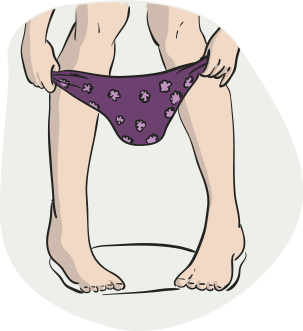
How do we know we have his rules ?
The rules are manifested by a blood loss. So maybe you'll notice their arrival feeling your panties are wet. It is also possible that you feel the blood flow, especially after sitting or lying. In this case, the blood accumulates but cannot flow. When you get back up, it finally flows naturally.
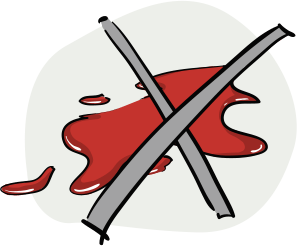
Are we losing a lot of blood ?
No. During the first rules, the loss is about 30 ml, equivalent to two tablespoons. Later, the quantity increases and can range from 50 to 150 ml. Most of the blood flows during the first two days of the rules. Especially don’t worry: over time, the volume of losses will stabilize. You will have time to adapt !
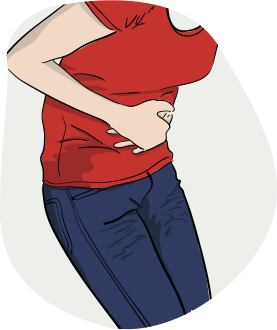
How do I relieve pain during my rules ?
You got a stomachache in your rules? These pains and cramps are due to the contraction of the uterus muscles under the effect of your hormones. Fortunately, there are ways to relieve them: take a hot bath, install a hot boil on your belly, or even do a little exercise, but avoiding sudden movements.
How to avoid leaks ?
At first, your rules will surely be irregular. To avoid leaks, be sure: think about changing you regularly, always keep a Ma Louloute kit in your bag (see also a replacement panties) and, of course, regularly change your protection. If you don’t have protection in your hand when your rules arrive, you can use handkerchiefs, toilet paper or paper towels to manage the emergency, waiting to find better !
Can I wear any garment during my rules ?
Of course! Your rules should not prevent you from doing what you want. The important thing is that you are comfortable in your movements.AYou choose the clothes in which you feel the best during your rules.
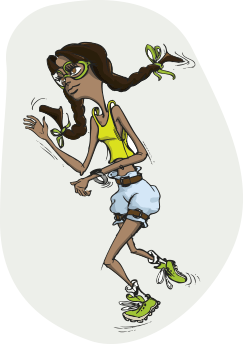
Do I want to stop my activities such as sport when I have my rules ?
Especially not! The more active you are, the less likely you will suffer from painful cramps. If you're afraid that leaks appear while you're doing sports, use the protection that you find most comfortable and will protect you the best.

Do other people know I have my rules ?
There is no reason why they know it, and you don’t have to change your behavior on this occasion. Moreover, most hygienic protections are so fine that it is really impossible to know that you are wearing it. If you wish, you can wear loose clothes for more safety and comfort. If, in addition, you regularly take baths or showers, and you correctly use your hygienic towels and/or pads, you do not run any risk.
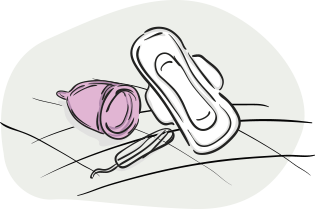
Do I often have to change my protection? And when ?
It is important to regularly change your hygienic protection. If you don’t do it, you may have leaks, and even let the bacteria develop very unpleasant.. By changing your hygienic towel or tampon every four hours, you'll be quiet.
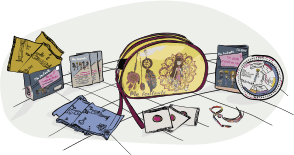
What about hygienic protections and products delivered in the Kit?
The Kit was designed and developed in close collaboration with gynecologists and health professionals.
All of our protections contained in the kit are made exclusively to our brand “ MA LOULOUTE ” meet sanitary standards and offer quality protection.
Particular attention is paid to the choice of materials. Our products have been selected and manufactured with natural materials, tested under dermatological control.
Our intimate protections are in extra-soft and hypoallergenic veil, and free from any trace of pesticide and our intimate towels, made to 99% with natural products!
100% Bio recharges will come in 2019 !
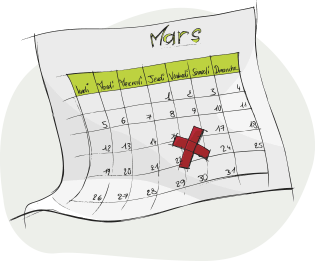
I've been settled for a few months and yet my rules are irregular, why ?
Having irregular rules is very common in the first year following the arrival of your first rules. We must not be worried. It is the time for your body to organize and at its pace. Trust him, he knows what he does. However, over a year, you need to worry if the interval between two of your cycles exceeds 40 days or if it is less than 20 days. If this is the case, don’t hesitate to talk to your mom, or to someone close to you and make an appointment with a gynaecologist to look for the cause. It is important for you to note on your agenda every beginning of the cycle that corresponds to the first day of your rules. You can also use the calendar you will find in your Kit. It allows you on the one hand to calculate the predictable date of your next rules, and on the other to understand what is happening in your body during your cycle.

I don’t dare talk about it, I’m ashamed, I’m embarrassed, how do I approach the subject ?
With simple words, like “I have my rules” without shouting on all roofs):
You're on the ground! You got them !
Most women around the world use euphemisms to talk about their rules, which is indicative of shame and embarrassment. There are about 5,000 different terms to talk about the rules, did you know ?
This may seem anodine, yet it recalls the great taboo that reigns around. We must not inertify this discomfort, it would assume that it is something bad, something we should be ashamed of.
The rules are not something "disgraceful" or "uncomfortable", but a natural process that operates in your body. And so don’t hesitate to say “I have my rules”, it will certainly help one day to drop that taboo.
I’m 14 and I have all the symptoms and yet they haven’t arrived yet? Why? i am the last of my class and i start to worry.
The first rule to adopt is that you must not be worried. It is common that girls of your age do not have their rules yet. Did you ask your mom when she got them? This will give you an indicator.
And say that even if you are the same age as the girls of your class, you will not have the same changes at the same time! Each woman experienced all the premenstrual symptoms in her own way, and at her own pace. What you need to know is that you will not be able to accelerate or delay them. They will all arrive at a moment, and you will all come to the same result! It’s time for your body and hormones to organize together and gently. Trust them, they know what they do.
I also invite you to get closer to a member of your family, your attending doctor or family planning and to exchange with them. They will reassure you and answer all your questions.

What about the "cup & buffer"? Or "menstrual towel" ?
It is still too early for you to use a “ Cup or a buffer” when your first rules arrive.
First, you need to understand how to use hygienic protections. You will also need to know your cycle, the intensity and duration of your discharges, to learn to regularly change your hygienic protections, to wash your hands before and after every change of protection and perfect intimate hygiene during your rules.
All this learning is important and it is done in stages. Don't hurry.
For “menstrual panties or washable towels”, we think they can be difficult to approach for the first rules (the storage of used towels in a school backpack for a whole day of class, their washing, etc.). is not practical at all:((()
You need something simple to use in order to understand in stages what happens to you.
They can be used in addition to your protections, during the practice of your sport or during the night.
